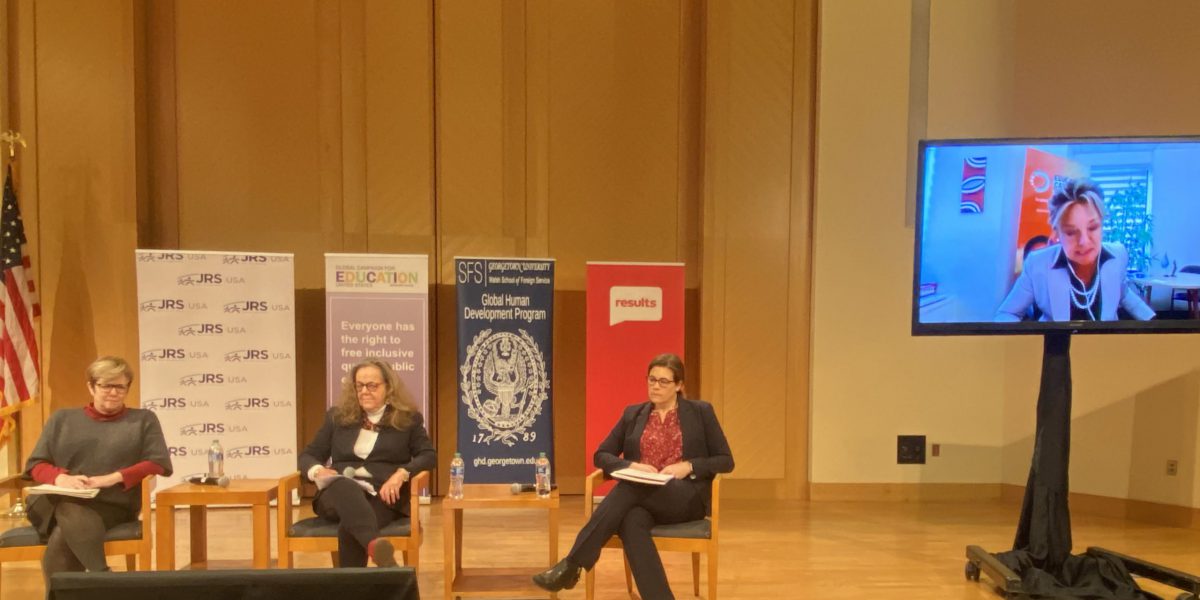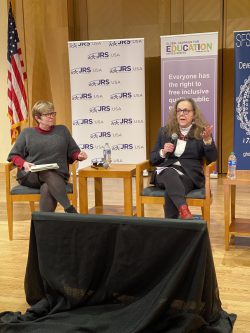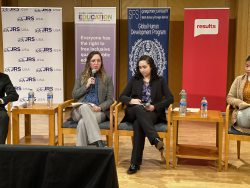JRS/USA: Education in Emergencies Event at Georgetown University
26 January 2023|Brooke Wood

“To invest in people, invest in education.”
Tuesday, January 24th, marked International Education Day, established by the United Nations to celebrate the importance of education.
To further the discussion, JRS/USA joined a list of partner organizations to sponsor a panel event at Georgetown University. The event featured US government representatives, education in emergency champions, experts, and young leaders, centered around a multi-year High-Level Financing Conference for Education Cannot Wait (ECW) that takes place in February. The conference is a crucial opportunity for the US to commit to financing quality, inclusive, and transformative education for over 222 million children and adolescents living in crisis and conflict settings around the world.
Dr. Joel Hellman, the Dean of Georgetown University’s Walsh School of Foreign Service started the event with remarks on Georgetown University’s commitment on ensuring global access to education. The first panel discussion, titled “Financing the Education in Emergencies sector: A Case for Investment in #222MillionDreams 📚 ✨, featured Special guests Yasmine Sherif, Director ECW, LeAnna Marr, Deputy Assistant Administrator, Center for Education, U.S. Agency for International Development (USAID), and Elizabeth Campbell, Deputy Assistant Administrator, Bureau for Population, Refugees, and Migration (PRM) at the U.S. Department of State. The discussion was moderated by Joan Lombardi, Ph.D, Senior Fellow, Georgetown Collaborative on Global Children’s Issues and Senior Scholar, Center for Child and Human Development.
The conversation focused on the importance of ECW funding for the 222 million children and adolescents who aren’t receiving a quality education due to conflict and crisis. Due to this vast number, Yasmine emphasized that “every pledge matters, no matter how big or small because education is a long term investment.” Elizabeth Campbell of PRM described the “diversified stakeholders” that allow ECW to disburse funds at the start of a crisis versus months or years later. She attributed the Syrian crisis as a pivotal moment when education in humanitarian settings began to be prioritized.
Later in the conversation, LeAnna Marr from USAID applauded the increase of access to education but stressed that it’s the continued learning that’s critical for hope.
Throughout, attendees were able to engage with speakers via questions as speakers continued to reiterate the necessity of global educational opportunities. To finish out the panel, Representative Grace Meng provided her own insight which coincided with introduction of a bipartisan congressional resolution affirming US support.
 A second panel, titled “Nothing About Us Without Us: Youth Led Solutions to Education Crises,” featured a variety of young leaders who shared their own unique experiences and proposed solutions for expanding access to education.
A second panel, titled “Nothing About Us Without Us: Youth Led Solutions to Education Crises,” featured a variety of young leaders who shared their own unique experiences and proposed solutions for expanding access to education.
Overall, the event encouraged further discussion on the importance of building political will andfunding for education in conflict settings, including the work of ECW. Attendees were engaged and enthusiastic as the speakers passionately discussed global education needs.



